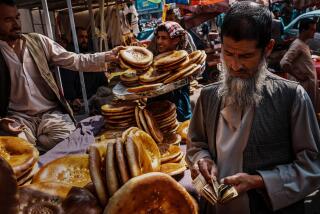Afghan president heads to Washington
Reporting from Kabul, Afghanistan — Nearly canceled amid some public squabbling, the visit is considered crucial to mending ties. The Obama administration appears keen on forging more pragmatic government-to-government links.
Rarely does a state visit so closely resemble a very public session of marriage counseling.
Afghan President Hamid Karzai’s four-day trip to Washington, which starts Monday, offers a much-needed chance to mend his strained relationship with the Obama administration at a pivotal moment in his country’s wrenching conflict.
With so much at stake in preserving the partnership, the two leaders probably will strive to present a united front in the face of a determined Taliban insurgency and growing restiveness among America’s European allies in the nearly 9-year-old war.
“A lot of eyes are on this trip, especially after all the recent problems,” said Fawzia Kofi, an Afghan lawmaker, referring to a string of anti-Western statements by Karzai last month.
Karzai’s remarks in early April included the startling, some called it rhetorical, assertion that foreign meddling might just drive him to join the Taliban. That prompted the White House to hint that the visit might be canceled.
Both sides stepped back from that particular brink, playing down the squabble’s significance. But this visit appears to mark a definitive break with the folksy, highly personal nature of Karzai’s dealings with President Obama’s predecessor, President Bush.
The new emphasis, several officials familiar with the planning of the visit say, lies in forging more pragmatic government-to-government links. That shift was underscored by the fact that nearly all of Karzai’s key ministers, at U.S. urging, are accompanying him to Washington.
“America wants to draw some lines for Karzai,” said Najiba Ayubi, managing director of the Killid Group, an Afghan media organization. “He’ll be told, ‘Here are your responsibilities, and here are ours.’ ”
Karzai is likely to be pressed hard in private for a commitment to rein in corruption in his government and for assurances that parliamentary elections scheduled for September will be reasonably fair, a very real concern in light of the massive fraud that marred last August’s presidential vote.
Although Karzai can point to little tangible progress on the corruption front six months into his second term, the somewhat hectoring tone taken by top White House aides in March as Obama arrived for a brief visit to Kabul is likely to be muted in Washington in anything other than a closed-door setting.
Even among Karzai’s critics at home, and they are legion, there is little appetite for seeing him publicly dressed down in such a high-profile setting.
“For Afghans, it’s important not to see your president humiliated,” political scientist Haroon Mir said.
The visit comes as Western forces are preparing to try to oust the Taliban from the province of Kandahar and restore control to the central government, a task complicated by the president’s half-brother, Ahmed Wali Karzai, who heads the provincial council but wields powers far beyond that mandate.
But Western diplomats in Kabul realize that dislodging Karzai’s difficult sibling is practically impossible before the escalating military operations this summer. Instead, they are looking to the Afghan president to take other steps to help the Kandahar campaign succeed.
Thus far, though, Karzai’s public comments have centered on the need to avoid civilian casualties in the fighting. On Thursday, the last working day before his departure for Washington on Sunday, he issued a statement calling for more cooperation between foreign forces and Afghan authorities.
Soon after Karzai’s return to Afghanistan, he is expected to preside over a so-called peace jirga, a traditional tribal-style gathering meant to air views on how, whether and when to embark on negotiations with insurgents.
The gathering was to have been held early this month, but was rescheduled for late May or early June, a move widely interpreted as allowing for the Washington meetings to take place first.
The United States and other Western partners have signed on to the wooing of low-level insurgents with incentives such as jobs, but there is some nervousness that Karzai could depart from the agreed-to script on the subject of engaging ranking Taliban figures.
Karzai has said that anyone wanting to talk peace must break with groups such as Al Qaeda, renounce violence and agree to respect the Afghan Constitution. But he previously has offered to negotiate with figures such as Taliban chief Mullah Mohammed Omar, notorious for his alliance with Osama bin Laden.
Because the United States recognizes that there is little alternative to dealing with Karzai, there is hope that the visit will bolster his sagging standing at home and abroad. But many believe that the Afghan leader has been too badly damaged by long-term disillusionment with his government and anger over blatant vote-rigging last summer.
“He wants to turn a new page, show that he has the support of the U.S. administration, and that he is considered a strategic partner,” said Mir, the political scientist. “But his position is significantly weakened, internally and internationally.”
The visit appeared to generate little excitement among Afghans, with some worrying about a steeper slide into chaos.
“Right now there is no security, and too much corruption,” said Sidiq Bezhan, a 24-year-old businessman. “So if anything else goes wrong in this meeting, it could have a very bad effect on the future of our country.”
More to Read
Sign up for Essential California
The most important California stories and recommendations in your inbox every morning.
You may occasionally receive promotional content from the Los Angeles Times.










